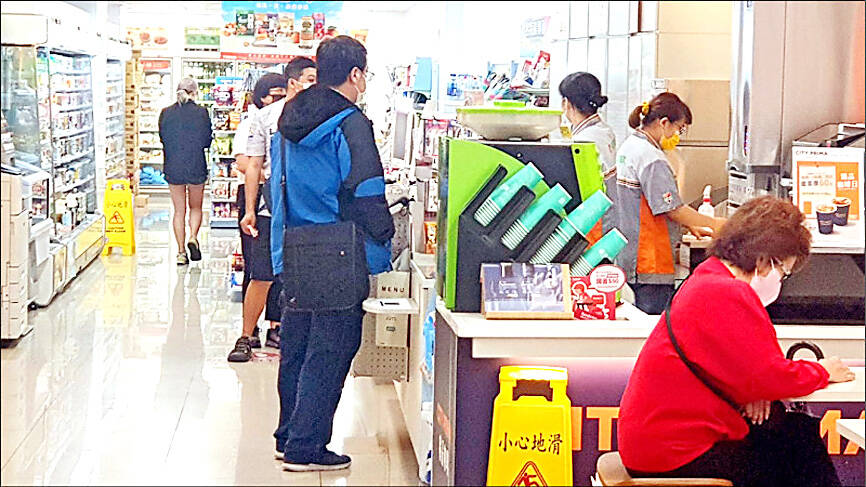Taiwan had 13,706 convenience stores — one per 1,703 people — as of the end of last year, Ministry of Economic Affairs data showed.
Based on the country’s population of 23.34 million, Taiwan’s store density exceeded that of Japan (one per 2,220 people), but was lower than South Korea’s (one per 897 people), the data released over the weekend showed.
The largest convenience store chain in Taiwan is 7-Eleven, with 6,859 outlets, ahead of FamilyMart with 4,234 stores at the end of last year.

Photo: Taipei Times
Backed by a 3.4 percent increase in the number of outlets, Taiwan’s convenience store operators generated record revenues of NT$412.6 billion (US$13.03 billion) last year, the ministry said.
An 8 percent annual rise in total sales marked the 14th consecutive year of year-on-year growth, with each outlet generating an average of NT$30.1 million, up from NT$28.83 million a year earlier, it said.
Between 2020 and last year, sales at convenience stores in Taiwan increased an average 5.6 percent.
As outlets recorded an average annual increase of 4.1 percent from 2016 to 2019, convenience stores appear to have bounced back in the post-COVID-19 pandemic era, the ministry said.
The rebound has been driven in part by a push to diversify their products, services and payment offerings, such as launching cross-branded products with prestigious brands and famous restaurants, and providing more healthy food and drink options, it said.
Alcoholic and nonalcoholic beverages accounted for about 60 percent of stores’ revenue last year, down 6.5 percentage points from a year earlier, it said.
Other food items made up 31.9 percent of the sales, up 6.5 percentage points from a year earlier.
Convenience stores usually see peak season effects in January during a buying spree ahead of the Lunar New Year holiday, while hot weather and summer vacations in July and August are expected to create new business opportunities, the ministry said.
Taiwan’s largely 24-hour convenience stores have become an integral part of urban life in the past few years.
Taipei’s Linsen N Road has the highest store density for a single street in the region, with one every 100m, local media reports said.

Taiwan has received more than US$70 million in royalties as of the end of last year from developing the F-16V jet as countries worldwide purchase or upgrade to this popular model, government and military officials said on Saturday. Taiwan funded the development of the F-16V jet and ended up the sole investor as other countries withdrew from the program. Now the F-16V is increasingly popular and countries must pay Taiwan a percentage in royalties when they purchase new F-16V aircraft or upgrade older F-16 models. The next five years are expected to be the peak for these royalties, with Taiwan potentially earning

STAY IN YOUR LANE: As the US and Israel attack Iran, the ministry has warned China not to overstep by including Taiwanese citizens in its evacuation orders The Ministry of Foreign Affairs (MOFA) yesterday rebuked a statement by China’s embassy in Israel that it would evacuate Taiwanese holders of Chinese travel documents from Israel amid the latter’s escalating conflict with Iran. Tensions have risen across the Middle East in the wake of US and Israeli airstrikes on Iran beginning Saturday. China subsequently issued an evacuation notice for its citizens. In a news release, the Chinese embassy in Israel said holders of “Taiwan compatriot permits (台胞證)” issued to Taiwanese nationals by Chinese authorities for travel to China — could register for evacuation to Egypt. In Taipei, the ministry yesterday said Taiwan

Taiwan is awaiting official notification from the US regarding the status of the Agreement on Reciprocal Trade (ART) after the US Supreme Court ruled US President Donald Trump's global tariffs unconstitutional. Speaking to reporters before a legislative hearing today, Premier Cho Jung-tai (卓榮泰) said that Taiwan's negotiation team remains focused on ensuring that the bilateral trade deal remains intact despite the legal challenge to Trump's tariff policy. "The US has pledged to notify its trade partners once the subsequent administrative and legal processes are finalized, and that certainly includes Taiwan," Cho said when asked about opposition parties’ doubts that the ART was

If China chose to invade Taiwan tomorrow, it would only have to sever three undersea fiber-optic cable clusters to cause a data blackout, Jason Hsu (許毓仁), a senior fellow at the Hudson Institute and former Chinese Nationalist Party (KMT) legislator, told a US security panel yesterday. In a Taiwan contingency, cable disruption would be one of the earliest preinvasion actions and the signal that escalation had begun, he said, adding that Taiwan’s current cable repair capabilities are insufficient. The US-China Economic and Security Review Commission (USCC) yesterday held a hearing on US-China Competition Under the Sea, with Hsu speaking on